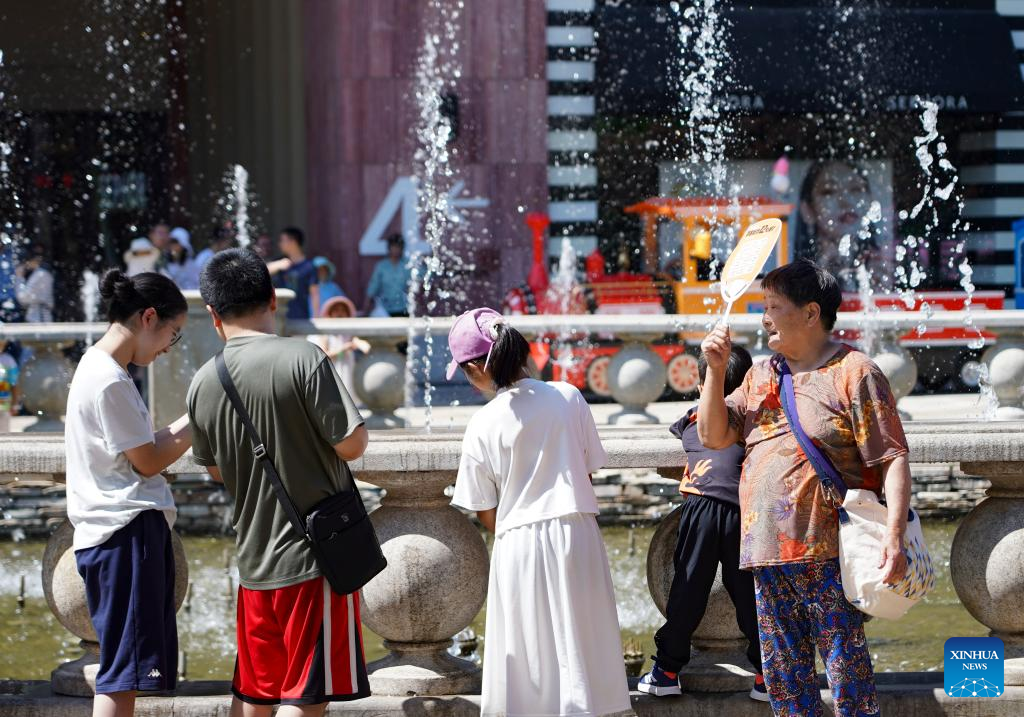China Focus: Severe weather tests China, brings more heat, rainstorms

People stay under a canopy to shield themselves from the sun at Chaoyang Park in Beijing, capital of China, June 9, 2024. (Xinhua/Chen Zhonghao)
While northern China bakes under a scorching heat wave with record-breaking daily maximum temperatures, rainstorms are forecasted to sweep along many provincial-level regions in the south, raising multiple alerts across the country.
At 6 a.m. Tuesday, the National Meteorological Center (NMC) issued an orange high-temperature alert, the second highest level in the country's warning system, forecasting daytime high temperatures in regions including Beijing, Tianjin, Hebei, Henan, Shangdong and Xinjiang, among others. Temperatures in parts of Hebei and Xinjiang may surpass 40 degrees Celsius.
In north China's Hebei Province, the provincial meteorological observatory renewed the red alert for high temperatures on Tuesday, at 5 a.m., saying that many meteorological stations in an area stretching from the southern parts of Baoding City to the cities of Xingtai and Handan may see their hottest weather with temperatures exceeding 40 degrees Celsius.
The agricultural and rural affairs department of Hebei is closely monitoring the adverse effects of high temperatures on crop growth and harvesting, and providing guidance to farmers on summer harvesting and planting as well as heatstroke prevention measures.
"From Tuesday to Thursday, high temperatures in the central and southern parts of Hebei Province will continue to intensify. But there will be a province-wide precipitation starting on Thursday, which will ease the heat," said Jin Xiaoqing, chief forecaster of the observatory.
Beijing, the Chinese capital, is also enduring a 3-day heat wave starting Tuesday.
The Beijing Municipal Education Commission suggested that kindergartens, primary and secondary schools and vocational middle schools should reduce outdoor physical education classes and outdoor activities.
"As the heat goes up, so does the threat of outdoor electrical equipment fires," said a property manager surnamed Zheng at a residential compound in Beijing's Fengtai District. "We keep a close eye on the equipment susceptible to heat and have deployed a team of engineers to inspect electric vehicle charging piles and outdoor air conditioning units."
According to a forecast published by NMC, high temperatures are expected to develop in northern China. Central and southern parts of north China, most of the Huanghuai area, southern Shanxi, and the Guanzhong area in Shaanxi are expected to experience 6 to 8 days of temperatures exceeding 35 degrees Celsius. Some areas in Henan may see 9 to 10 days of such high temperatures.
During this period, the daily maximum temperatures in some areas of Hebei, Henan, Shanxi and Shandong may reach or exceed historical records for the same period, said NMC.
From 8 a.m. Monday to 6 a.m. Tuesday, 27 national meteorological stations in Tianjin and provinces of Shandong, Hebei and Jiangsu have already logged daily maximum temperatures breaking the historical records for early June.
"Recently, many parts of the world have experienced high temperatures. The primary cause is global warming, which has led to different regions being controlled by various types of high-pressure systems, resulting in prolonged periods of heat," said Zheng Zhihai, chief forecaster of the National Climate Center.
Highlighting that the heat of this summer comes a little sooner than usual, Zheng stated that global warming, along with the influence of the western Pacific subtropical high and continental high-pressure systems, contributes to China's high-temperature weather.
Down south, however, rainstorms have become another issue.
China's national observatory published a blue alert for rainstorms at 6 a.m. Tuesday, expecting heavy rainfall to batter some of the country's southern parts.
From 8 a.m. Tuesday to 8 a.m. Wednesday, heavy to torrential rains are expected to affect parts of southern Zhejiang, northern Fujian, central and northern Jiangxi and southern Hunan, among other regions, said NMC.
In the last 24 hours, Taihe County in east China's Jiangxi Province has been battered by rainstorms, receiving 190 mm of rainfall, said local weather authority at 8 a.m. Tuesday.
On Monday afternoon, the Jiangxi provincial meteorological bureau initiated a Level IV emergency response to significant meteorological disasters.
To cope with the weather, Jiangxi has ramped up emergency efforts to protect the lives and property of its people. Measures include enhancing precise monitoring of hazardous weather conditions, optimizing alert systems, and strengthening communication and coordination among departments such as housing and construction, transportation, culture and tourism and energy.
"The risk of disasters such as flooding and urban waterlogging is high due to the extended duration of this rainfall and its overlap with previous precipitation areas," said Xiao An, chief forecaster of Jiangxi provincial meteorological observatory. "Proactive measures are being implemented in advance to mitigate the impact of the severe weather."■

A delivery man works in Beijing, capital of China, June 11, 2024. (Xinhua/Ren Chao)

A person walks under the sun in Beijing, capital of China, June 9, 2024. (Xinhua/Chen Zhonghao)

A child plays at Chaoyang Park in Beijing, capital of China, June 9, 2024. (Xinhua/Chen Zhonghao)

People cool themselves near a fountain in Beijing, capital of China, June 9, 2024. (Xinhua/Chen Zhonghao)

People use umbrellas to shield themselves from the sun in Beijing, capital of China, June 9, 2024.
